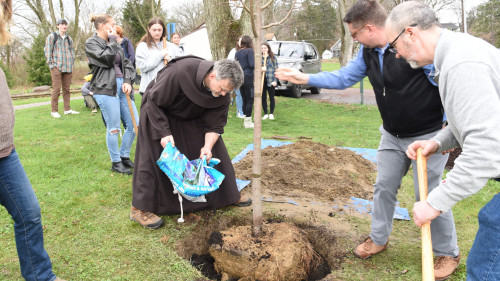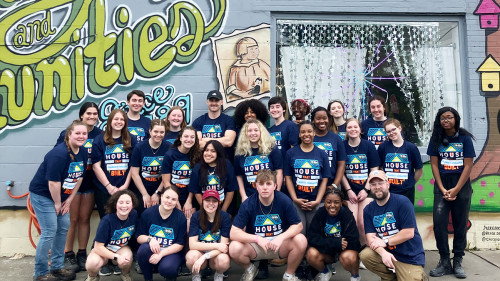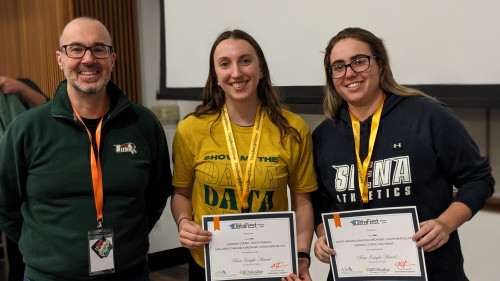
Suck it up. Go for a workout. Keep it to yourself.
The narrative around men’s mental health needs to change. Everyone goes through tough times, and ignoring pain and keeping things inside won’t make problems go away.
One of the many wellness goals of Siena’s Project HOPE is to offer healthy ways for students to deal with the stress and anxiety of college life, which can sometimes rise to challenging levels. To that end, the College welcomed youth mental health advocate Isaiah Santiago to campus on March 11, for an open talk aimed at specifically at men.
Will Hunter ’24, who serves as a certified peer educator at Siena, helped organize the event in his role with Project HOPE and Siena’s Office of Health Promotion. Hunter was tasked by the College with getting a men’s mental health program off the ground. He had worked before with Kate Kaufman Burns, director of health promotion, and she tapped him for the new initiative.
“I’ve learned how to use past experiences to manage struggles I might have, and live a fulfilling life,” said Hunter. “My dad told me that there is always light at the end of the tunnel, and the older I’ve gotten the more I realize that’s true.”
Hunter, who interned with and is now working at the National Alliance on Mental Illness, met Santiago – himself a college student – at a fall professional conference and knew immediately he had to bring him to Siena for the first wellness event for men.
“His main message was that it’s OK to not be OK,” said Hunter. “He understands that for a guy in our society, it’s more difficult to express emotions.”
Santiago told the group that men “are not lone wolves” and encouraged them to understand that they are not by themselves.
“He told us that feelings we are experiencing and things we are going through are probably shared with every single person in our friend group, and we should tap into that,” Hunter said. “We have a lot in common, and we are not alone.”
Santiago used the acronym HOT as a reminder to be Honest, Open, and Transparent in the lifelong journey of developing emotional intelligence. Bottling up emotions only makes problems worse.
Other Saints have been involved on campus in promoting good mental health. Hassan Rizwan ’26 said boys and men are expected to be stoic, to be accustomed to jumping right up after being hurt physically or emotionally.
“That’s not a robust way to live your life,” said Rizwan. “We must prioritize our mental health because if not treated in a healthy manner it can lead to serious issues like depression, anxiety, and substance abuse that can go unnoticed and untreated. By paying attention to our mental health we can build resilience, cope with stressors more effectively, and lead happier, more fulfilling lives.”
Luke Keith ’24 agreed that addressing mental health among young men is extremely important “as societal norms often discourage them from seeking help or expressing vulnerability.”
“By fostering an open dialogue, providing support, and sharing our personal battles, we hope to empower young men in our Siena community to pay closer attention to their mental health,” he said. “Everyone deserves an opportunity to seek out help.”
One important resource available for Saints is the Counseling Center, located in Foy Hall. Students can access up to 10 free appointments each academic year.
“While much has already been done, we need to continue our work to decrease the stigma against mental illness, particularly among men,” said Associate Director Tom Templeton. “Reinforcing parity between physical and mental health is one way to do that. We need to send the message that seeking help – whether it’s for social anxiety or strep throat – is a good move.”
Kaufman Burns acknowledges that it can be especially difficult for young men to reach out for help with their mental health and well-being.
“Asking for help when you’re struggling is a sign of strength,” she said. “This is the work we are doing in prevention to change the conversation, shift the culture, so that all students - especially male-identifying students - feel as though they can seek support and get the help they need when life happens, whether that’s depression, anxiety, grief or loneliness. This is about a shared human condition and struggle.”
Cathy Dockum, coordinator for Project HOPE said the program’s aim is “to create safe spaces where students can openly discuss mental health and show that reaching out for support is not a sign of weakness, but a brave step towards growth.”
Dockum and Hunter also remind the Siena community that the national crisis hotline of 988 is available for anyone, 24/7, via phone or chat. This free resource is for any mental health crisis.

